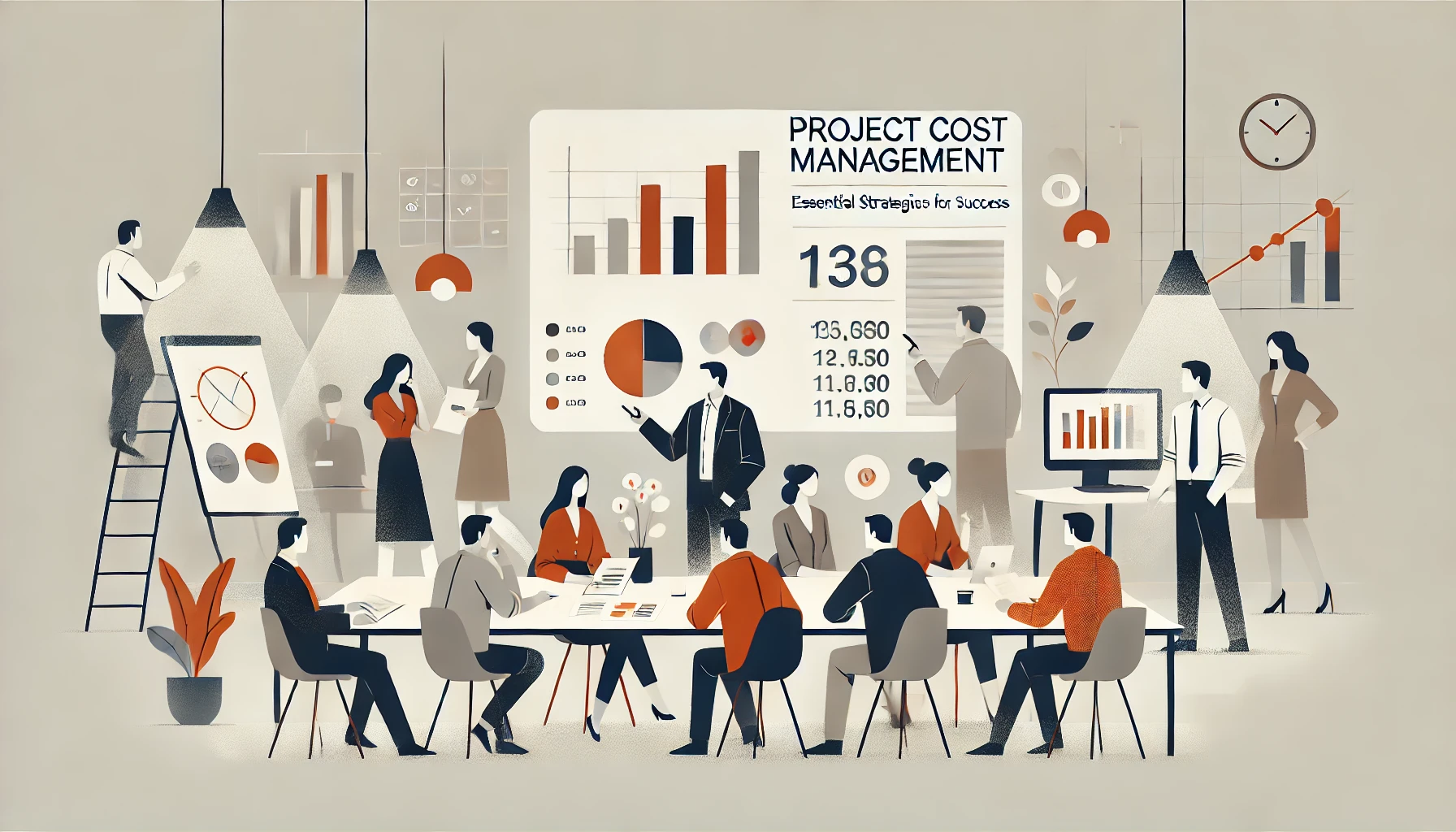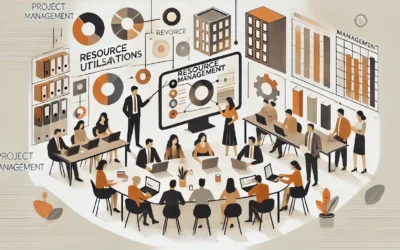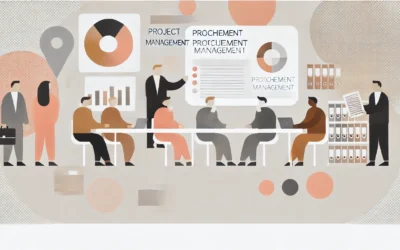Introduction
Cost Management is a fundamental aspect of successful project execution, focusing on planning, estimating, budgeting, financing, funding, managing, and controlling costs throughout the project lifecycle. Recognised by the Project Management Institute (PMI) as one of the key Knowledge Areas, Cost Management provides a structured approach to ensuring that projects are completed within approved budgets.
In this comprehensive guide, we will explore the key components of Cost Management, its significance in the project process, and practical strategies for project managers to implement it effectively. By mastering these techniques, managers can enhance financial performance, reduce risks, and significantly increase the likelihood of project success.
Effective cost management isn’t just about cutting expenses; it’s about optimising resource allocation to deliver maximum value. As we navigate through the complexities of modern project execution, the ability to accurately forecast, track, and control costs becomes increasingly crucial. This article aims to equip you with the knowledge and tools to excel in this critical aspect of project management.
What is Cost Management?
Project Cost Management involves the processes required to plan, estimate, budget, finance, fund, manage, and control costs so that the project can be completed within the approved budget. This Knowledge Area focuses on four main processes: Plan Cost Management, Estimate Costs, Determine Budget, and Control Costs.
Effective Cost Management is essential for maintaining project viability, securing stakeholder support, and ensuring that resources are used efficiently. It encompasses various methodologies and tools designed to provide accurate cost estimates, establish realistic budgets, and monitor and control expenditures throughout the project lifecycle. In today’s competitive business environment, cost management has become a key factor in project success and organisational profitability.
This aspect of project management is not a one-time effort but a continuous process that runs from project initiation to closure. It requires a deep understanding of project scope, timelines, resources, and potential risks. Project leaders must be adept at balancing cost constraints with other project variables such as quality, time, and scope.
Moreover, Cost Management extends beyond just tracking expenses. It involves making strategic decisions about resource allocation, evaluating the financial implications of project changes, and ensuring that the project delivers value commensurate with its costs. By fostering a cost-conscious culture within the project team, managers can ensure that financial considerations are integrated into every aspect of the project.
Key Components of Cost Management
Plan Cost Management
Plan Cost Management is the process of defining how the project costs will be estimated, budgeted, managed, monitored, and controlled. This process results in a cost management plan that outlines:
- Units of measure for each resource
- Level of precision and accuracy for cost estimates
- Organisational procedures links
- Control thresholds for monitoring cost performance
- Rules for measuring performance
- Reporting formats and frequency
A well-developed cost management plan ensures that all team members understand how costs will be managed throughout the project. It serves as a roadmap for cost-related activities, providing clarity and direction to all involved parties.
The planning process also involves identifying potential cost risks and developing mitigation strategies. This might include addressing issues like currency fluctuations, market volatility, or resource scarcity that could impact project costs. By anticipating and planning for these challenges, project managers can ensure more consistent financial performance throughout the project.
Estimate Costs
Estimating Costs involves developing an approximation of the monetary resources needed to complete project activities. This process includes:
- Identifying and considering various costing alternatives
- Determining the cost of project deliverables
- Evaluating potential risks and their cost implications
- Applying estimation techniques (analogous, parametric, bottom-up, etc.)
Accurate cost estimation is crucial for developing realistic project budgets and securing appropriate funding. It requires a thorough understanding of the project scope, market conditions, and historical data from similar projects.
Cost estimation is not a one-time activity but an iterative process. As the project progresses and more detailed information becomes available, estimates should be refined to improve their accuracy. This ongoing refinement helps in maintaining the project’s financial health and informs decision-making throughout the project lifecycle.
Determine Budget
Determining the Budget involves aggregating the estimated costs of individual activities or work packages to establish an authorised cost baseline. This process includes:
- Combining cost estimates with planned expenditures
- Adding contingency reserves for unknown risks
- Establishing cost benchmarks for project performance measurement
The budget determination process is critical as it sets the financial boundaries within which the project must operate. It provides a baseline against which actual costs can be compared, allowing for effective cost control and performance measurement.
A well-structured budget should be time-phased, aligning expected costs with the project schedule. This alignment enables more accurate cash flow projections and helps in identifying periods of high financial activity or potential resource constraints.
Control Costs
Controlling Costs is the process of monitoring the status of the project to update the project costs and managing changes to the cost baseline. Key activities include:
- Monitoring cost performance
- Ensuring that all appropriate changes are recorded accurately in the cost baseline
- Preventing incorrect, inappropriate, or unapproved changes from being included
- Informing appropriate stakeholders of approved changes
Effective cost control requires regular monitoring and analysis of project expenditures. Techniques such as Earned Value Management (EVM) can be particularly useful in tracking cost performance and forecasting final project costs.
Cost control is not just about identifying variances; it’s about understanding why they occur and taking appropriate corrective actions. This might involve re-allocating resources, adjusting project scope, or implementing cost-saving measures to bring the project back on track financially.
Importance of Cost Management
Effective Cost Management is crucial for project success for several reasons:
- Financial Viability: By ensuring that projects are completed within budget, Cost Management directly contributes to the financial viability of both the project and the organisation. It helps in maintaining profitability and ensuring a positive return on investment. Furthermore, demonstrating strong cost management capabilities can enhance an organisation’s reputation and lead to new business opportunities. Conversely, poor cost management can lead to financial losses and damage to the organisation’s credibility.
- Resource Optimisation: Proper cost practices help in optimising the use of resources. By accurately estimating and tracking costs, project managers can ensure that resources are allocated efficiently and effectively throughout the project lifecycle. This optimisation not only helps in controlling costs but also contributes to improved project performance and quality. When resources are used judiciously, teams can focus on delivering value rather than managing shortages or excesses.
- Decision Making: Accurate cost information facilitates informed decision-making at all levels of the project. When project leaders have a clear understanding of the financial implications of their decisions, they can make choices that balance cost considerations with other project objectives. Cost data can inform decisions about project scope, scheduling, risk management, and resource allocation. It provides a quantitative basis for evaluating alternatives and selecting the most cost-effective solutions.
- Stakeholder Confidence: Demonstrating effective cost management can boost stakeholder confidence in the project team and the overall project. When stakeholders see that costs are being actively managed and that the project is staying within budget, they’re more likely to trust the team’s ability to deliver on project goals. This increased confidence can lead to better stakeholder support, smoother approval processes, and more positive project relationships overall.
- Risk Management: Cost Management plays a crucial role in project risk management. By identifying potential cost risks early and developing mitigation strategies, project teams can reduce the financial impact of unforeseen events. Moreover, maintaining financial reserves as part of the cost management strategy provides a buffer against risks, enhancing the project’s resilience to unexpected challenges.
- Performance Measurement: Cost metrics provide a quantitative measure of project performance. By comparing actual costs against the baseline budget, project managers can assess how well the project is progressing and identify areas that may need attention. Techniques like Earned Value Management (EVM) allow for integrated measurement of cost, schedule, and scope performance, providing a holistic view of project health.
- Continuous Improvement: The data and insights gained through cost management processes can drive continuous improvement in project practices. By analysing cost performance across projects, organisations can identify trends, learn from experiences, and refine their estimation and budgeting processes. This focus on continuous improvement can lead to more accurate cost forecasting, better budget management, and enhanced financial performance in future projects.
Practical Tips for Effective Cost Management
Develop a Comprehensive Cost Management Plan
Create a detailed plan that outlines how costs will be estimated, budgeted, managed, and controlled throughout the project. This plan should be tailored to the specific needs of your project and align with organisational financial policies. Start by identifying all cost-related processes and tools, then map out how these will be applied throughout the project lifecycle.
Remember that a good cost management plan is both thorough and adaptable. As the project progresses and new financial information emerges, be prepared to refine your approach. Regularly review and update your strategy to ensure it remains relevant and effective throughout the project.
Use Multiple Cost Estimation Techniques
Employ a variety of estimation techniques to develop accurate cost forecasts. These might include analogous estimating, parametric estimating, bottom-up estimating, and three-point estimating. By using multiple techniques, you can cross-validate your estimates and increase their reliability.
Keep in mind that different estimation techniques may be more suitable at different stages of the project or for different types of costs. As the project progresses and more detailed information becomes available, refine your estimates to improve their accuracy.
Implement Earned Value Management (EVM)
Utilise Earned Value Management techniques to track cost performance and forecast final project costs. EVM provides an integrated view of cost, schedule, and scope performance, allowing for early identification of potential issues.
Familiarise your team with key EVM metrics such as Cost Performance Index (CPI) and Schedule Performance Index (SPI). Regularly calculate and analyse these metrics to gain insights into project performance and inform decision-making.
Establish Clear Cost Baselines
Develop a clear and comprehensive cost baseline that serves as a reference point for measuring cost performance. This baseline should include all approved project costs and be time-phased to align with the project schedule.
Ensure that the cost baseline is formally approved and communicated to all relevant stakeholders. Any changes to the baseline should go through a formal change control process to maintain its integrity as a measurement tool.
Monitor and Control Costs Proactively
Implement a system for regular cost monitoring and control. This might involve weekly or monthly cost reviews, depending on the project’s size and complexity. During these reviews, compare actual costs against the baseline, analyse variances, and develop corrective actions as needed.
Remember that effective cost control is proactive, not reactive. Encourage team members to report potential cost issues early, and be prepared to take swift action to address any negative cost trends.
Leverage Technology for Cost Tracking
Utilise project management software and financial tools to streamline cost tracking and reporting. These tools can automate many aspects of cost management, reducing the risk of errors and providing real-time visibility into project finances.
Ensure that your chosen tools integrate well with your organisation’s financial systems and provide the level of detail required for effective cost management. Train your team in the use of these tools to maximise their effectiveness.
Foster a Cost-Conscious Culture
Encourage a culture of cost awareness among all project team members. This involves educating the team about the importance of cost management, involving them in cost estimation and control processes, and recognising cost-saving initiatives.
Consider implementing incentive systems that reward cost-effective practices and innovative solutions that lead to cost savings without compromising project quality or scope.
Manage Scope Changes Diligently
Implement a rigorous change control process that includes a thorough assessment of the cost implications of any proposed changes. Ensure that all scope changes are properly documented, costed, and approved before implementation.
Be prepared to say no to scope changes that cannot be justified from a cost-benefit perspective. When changes are approved, update the cost baseline and communicate the changes to all relevant stakeholders.
Conduct Regular Cost Risk Assessments
Regularly assess and update cost-related risks throughout the project lifecycle. This might involve identifying new risks, re-evaluating existing risks, and adjusting risk response strategies as needed.
Ensure that your cost estimates and budgets include appropriate contingency reserves to account for identified risks. Regularly review the use of these reserves and adjust them as the project’s risk profile changes.
Learn from Past Projects
At the end of each project, conduct a thorough review of cost performance. Analyse what worked well and what could be improved in terms of cost estimation, budgeting, and control. Use these lessons to refine your cost management approaches for future projects.
Consider creating a database of historical cost data from past projects. This can serve as a valuable reference for future cost estimations and help in identifying cost trends across different types of projects.
Conclusion
Cost Management is a critical aspect of successful project execution. By developing and implementing effective cost strategies, project managers can ensure that projects are completed within budget, resources are used efficiently, and financial risks are minimised.
The key to effective Cost Management lies in understanding that it’s not just about cutting costs, but about optimising resource allocation to deliver maximum value. By leveraging a mix of thorough planning, accurate estimation, rigorous control, and a culture of cost consciousness, you can create a project environment where financial success is a natural outcome.
Remember that cost management is not a one-size-fits-all approach. As you apply the strategies and tips outlined in this article, tailor them to your specific project needs and organisational context. With practice and dedication, you can master the art of project Cost Management and significantly enhance your overall project management effectiveness.
Stay tuned for more detailed articles on each of the Project Management Knowledge Areas, where we will explore best practices, practical tips, and advanced techniques to help you excel in your project management career.






0 Comments